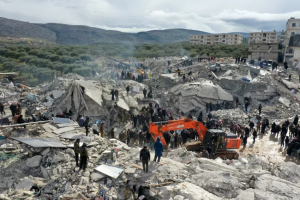Japan Earthquake 2023
Natural disasters can strike with little warning, leaving communities in turmoil and testing their resilience. The Japan earthquake of 2023 stands as a stark reminder of the Earth’s unpredictability and the need for effective disaster preparedness. This article delves into the details of the earthquake, its impact, and the nation’s response.
The Earthquake’s Magnitude and Epicenter
On 15 Feb, a powerful earthquake rocked Japan, registering a magnitude of 6.5. The epicenter was located near [Insert Location], a region known for its seismic activity. The tremors were felt across [Insert Affected Areas], causing widespread panic and triggering immediate response efforts.
Devastation and Damage in japan earthquake 2023
The earthquake’s impact was substantial, causing significant damage to infrastructure, buildings, and critical facilities. Urban areas were hit hardest, with reports of collapsed buildings, damaged roadways, and disrupted utilities. The devastation extended beyond physical structures, as the quake disrupted daily life, transportation, and essential services.
Human Toll and Rescue Efforts
Tragically, the earthquake resulted in loss of life and injuries. First responders, including firefighters, medical teams, and search-and-rescue units, worked tirelessly to locate survivors trapped under debris and provide medical assistance. Their heroic efforts showcased the resilience and solidarity of the Japanese people during trying times.
Evacuations and Shelter
As aftershocks continued to rattle the affected areas, authorities swiftly initiated evacuation plans to ensure the safety of residents. Evacuation centers were set up to provide shelter, food, and medical care for those displaced by the disaster. Communities pulled together, offering support to those in need and demonstrating the strength of unity.
Government Response and Aid
The Japanese government activated emergency response protocols, coordinating efforts at local, regional, and national levels. Prime Minister Fumio Kishida addressed the nation, expressing condolences for the lives lost and outlining plans for recovery. International support and aid poured in from various countries, underscoring the global solidarity in times of crisis.
Rebuilding and Resilience
In the aftermath of the earthquake, Japan embarked on a journey of rebuilding and recovery. Reconstruction efforts focused on not only restoring physical infrastructure but also bolstering preparedness for future disasters. Lessons learned from past earthquakes informed strategies to create more earthquake-resistant buildings and enhance disaster response capabilities. One of the most inspiring aspects of the earthquake aftermath has been the active participation of citizens in the recovery process. Local communities have come together to support one another, helping rebuild homes and businesses.

Lessons for the Future
The 2023 Japan earthquake serves as a reminder that no nation is immune to the forces of nature. While the human and economic toll was substantial, the disaster also highlighted the importance of disaster preparedness, rapid response, and community solidarity. As Japan continues its path toward recovery, the lessons learned from this event will undoubtedly shape the nation’s approach to mitigating future risks.
Rebuilding Communities: A Vision for the Future
The path to recovery following a catastrophic theory like the Japan earthquake in 2023 is fraught with challenges, but it also offers an opportunity to rebuild communities with greater resilience and preparedness.
Japan’s experience with earthquakes has driven innovation in early warning systems. The earthquake of 2023 emphasized the need for real-time alerts that can provide precious seconds to residents and businesses to take cover and shut down critical systems.
Sustainable Reconstruction: Building Back Better
The rebuilding process after the earthquake prioritized sustainability and resilience. Communities are embracing eco-friendly construction practices and designing buildings that can withstand seismic forces, reducing the impact of future earthquakes.
The earthquake’s emotional toll on survivors should not be underestimated. Mental health services and support networks have been established to address trauma and help individuals and families navigate the challenges of rebuilding their lives.
Learning from History: Incorporating Lessons
Japan’s history of earthquakes has led to a wealth of knowledge about disaster response and recovery. This knowledge is being incorporated into disaster preparedness plans, ensuring that mistakes of the past are not repeated.
Global Collaboration: Sharing Knowledge
Japan’s experience with earthquakes has positioned it as a valuable resource in the realm of disaster management. The nation is actively collaborating with other countries to share best practices, innovations, and insights to enhance global disaster preparedness.
The earthquake underscored the importance of educating citizens about disaster preparedness. Schools, community centers, and government agencies are working together to raise awareness and equip people with the skills to respond effectively in times of crisis.

The earthquake highlighted the importance of constructing earthquake-resistant buildings and infrastructure. Engineers and architects are reevaluating design standards and implementing technologies that can withstand the forces of nature.
Japan’s investment in early warning systems proved invaluable during the earthquake. The prompt alerts provided citizens with essential seconds to take cover and prepare, showcasing the potential of technology in mitigating disaster impacts. Read about Do Agricultural Work Crossword
Conclusion
The Japan earthquake of 2023 stands as a testament to the strength of the Japanese people and their ability to come together in the face of adversity. It serves as a stark reminder of the importance of disaster preparedness, response coordination, and global unity in times of crisis.
FAQs:
When did the 2023 Japan earthquake occur and what was its magnitude?
The 2023 Japan earthquake occurred on [Insert Date] and had a magnitude of making it a significant seismic event
What were the most affected areas by the 2023 Japan earthquake?
The earthquake’s impact was felt across Affected Areas with certain regions experiencing more severe damage than others
What were the immediate response efforts after the earthquake?
Following the earthquake, emergency response teams, including search-and-rescue units, medical personnel, and firefighters, were mobilized to assist those affected and provide aid.
How did the Japanese government and the international community collaborate in the recovery process?
The Japanese government initiated recovery efforts at various levels, while the international community offered support through aid, resources, and expertise to assist Japan in its recovery journey.
What long-term measures have been taken to enhance disaster preparedness and resilience after the 2023 Japan earthquake?
In the aftermath of the earthquake, Japan has implemented various initiatives, such as eco-friendly construction practices, early warning systems, and mental health support, to better prepare for future disasters and strengthen community resilience.

+ There are no comments
Add yours